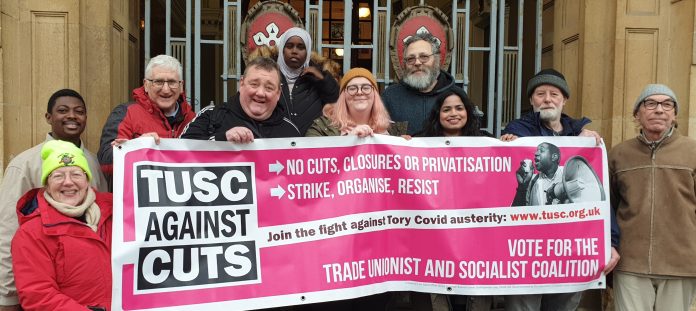Steve Score, Leicester Mayor Trade Unionist and Socialist Coalition (TUSC) candidate
Without the benefit of national recognition, or the election machines the main parties have, TUSC in Leicester achieved 2,173 votes in the Mayoral election, as well as 1,540 votes in the nine council seats we stood in across Leicester.
Voters had plenty of other alternatives to register a protest, at either the Tory government or the long-standing rule of Labour in Leicester. But our vote was much more a conscious vote for anti-austerity and socialist ideas. We got across the idea that councillors can lead the fight against cuts. TUSC’s ‘no-cuts budget’ position was also adopted by four independent candidates.
There was plenty of anger at the Tory government’s cost-of-living crisis, but also against the cuts made by the Labour mayor and city council, not least the 108% increase in the council’s district heating charge on six estates (only reduced from a proposed quadrupling by a campaign).
Everywhere we were able to explain our ideas we got a good response, in the live-streamed debates organised by BBC Radio Leicester and the Leicester Mercury, and in the meeting organised by a Muslim education organisation. We received many messages of support, including from trade union reps whose picket lines we had supported over the last few months.
We pledged to abolish the undemocratic mayoral system if elected, but used the election to build support for anti-austerity politics.
While the Tories were being hammered across the country, something different was going on in Leicester. In the last all-city elections in 2019, Labour won 53 of the 54 city seats, and Sir Peter Soulsby got 61% of the vote for City Mayor. After this election there are now 17 Tories, three Greens, and three Lib Dems with 31 Labour councillors. Soulsby won the mayoral election, but with his vote collapsing to 39.3%.
Days before the nominations opened, a national executive-imposed panel, which had superseded any democratic votes by local Labour Party members, summarily removed 19 Labour councillors and replaced them with new candidates, causing turmoil among many Labour Party members. Three of those councillors revealed their lack of principles by joining the Tories, and some had been part of a group who, days before the last general election, had publicly condemned Jeremy Corbyn for opposing right-wing Indian Prime Minister Modi.
Labour purge
The purge enabled the party leadership nationally and locally to remove Labour councillors who had criticised and opposed the City Mayor. This included councillors who had opposed cuts and the district heating charge hike. At least one councillor, Gary O’Donnell, had already resigned from Labour for attacking working-class people before the purge and had decided to stand in his ward.
TUSC’s All-Britain steering committee wrote to the deposed councillors offering them the opportunity to be part of the TUSC umbrella, but there was very little time to discuss before the election began. One purged councillor, Ruma Ali did join the TUSC slate, which already included two former Labour councillors. Many of those councillors ended up standing as independents.
Unfortunately, none of those independents retained their seats, despite getting good votes. There is scope to build alliances against the cuts along the lines that TUSC proposes, and more discussions will take place. One of the ousted councillors switched to the Greens and did win his seat, along with two new Green councillors in that ward.
There is an opportunity to build working-class unity, especially around the struggle against austerity. TUSC has advanced the cause of a working-class political alternative during this campaign.







